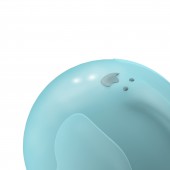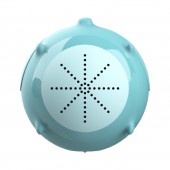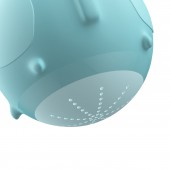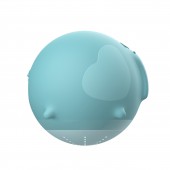
| THE AWARD |
| CATEGORIES |
| REGISTRATION |
| SUBMIT YOUR WORK |
| ENTRY INSTRUCTIONS |
| TERMS & CONDITIONS |
| PUBLICATIONS |
| DATES & FEES |
| METHODOLOGY |
| CONTACT |
| WINNERS |
| PRESS ROOM |
| GET INVOLVED |
| DESIGN PRIZE |
| DESIGN STORE |
| THE AWARD | JURY | CATEGORIES | REGISTRATION | PRESS | WINNERS | PUBLICATIONS | ENTRY INSTRUCTIONS |
Anibo Autism Tactile Training by Ziru Wang |
Home > Winners > Design #82703 >Interview |
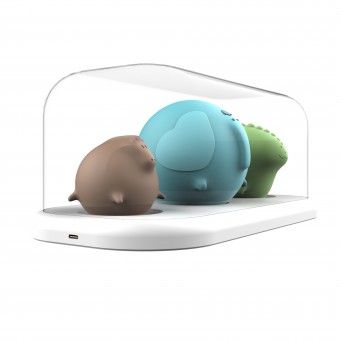 |
|
FS: What is the main principle, idea and inspiration behind your design?
ZW: In 2018 the CDC determined that approximately 1 in 68 children is diagnosed with an autism spectrum disorder. Most children were still being diagnosed after age 4, though autism can be reliably diagnosed as early as age 2. We found one of the most serious problems of autism is tactile disorders. The limited number of aids people can find on the market require the parents to assist.
FS: What has been your main focus in designing this work? Especially what did you want to achieve?
ZW: Based on the facts that autistic children are lack of tactile rehabilitation training aids, we propose Anibo. It introduces therapy into their daily life by the combination of training and shower which creates new way for tactile rehabilitation training.
FS: What are your future plans for this award winning design?
ZW: We still need to improve and perfect details of Anibo. The aim of us is to release products to the market as soon as possible. Not only the autism children need it but also healthy kids.
FS: How long did it take you to design this particular concept?
ZW: The project began in August 2018 in Beijing, China and finished in February 2019 in Beijing, China.
FS: Why did you design this particular concept? Was this design commissioned or did you decide to pursuit an inspiration?
ZW: We decide to pursuit an inspiration.
FS: Is your design being produced or used by another company, or do you plan to sell or lease the production rights or do you intent to produce your work yourself?
ZW: We plan to sell or lease the production rights.
FS: What made you design this particular type of work?
ZW: Autistic children with over-high tactile sensitivity need to train for a long time because of the harm of sensory neurons. There’s no product providing feedback information about training data to encourage parents and adjust the training plan. Parents are unable to train at home due to the lack of professiProducts for autistic children with over-high tactile sensitivity are boring.onal training methods and the difficult operation.
FS: Where there any other designs and/or designers that helped the influence the design of your work?
ZW: WellDesign Studio helped us so much of giving us a guidance of the design.
FS: Who is the target customer for his design?
ZW: All children especially the autistic children and their parents.
FS: What sets this design apart from other similar or resembling concepts?
ZW: It introduces therapy into their daily life by the combination of training and shower which creates new way for tactile rehabilitation training.
FS: How did you come up with the name for this design? What does it mean?
ZW: Original intention is to design a series of animal appearance. What's more they are in the shape of round that people like to call them 'Bobo'. So, 'Animal' and 'Bobo' become 'Anibo'.
FS: Which design tools did you use when you were working on this project?
ZW: Besides the material of the product, we also used ultra light clay, metal bracket and silica gel for idea model.
FS: What is the most unique aspect of your design?
ZW: It will be used into people's daily life. Anibo needs no rest time for training except their shower time.
FS: Who did you collaborate with for this design? Did you work with people with technical / specialized skills?
ZW: I worked with two team members, Songzhilin Shi and Guangyue Zhu. WellDesign Studio, a professional design studio, has given us so many advices.
FS: What is the role of technology in this particular design?
ZW: Essential conditon.
FS: Is your design influenced by data or analytical research in any way? What kind of research did you conduct for making this design?
ZW: We visited many autism nursing organization to do market research, user research and POMES analysis.
FS: What are some of the challenges you faced during the design/realization of your concept?
ZW: Due to the users' unpredictability, we had to spend more time to observe them and communicate to their guardian. Autistic children are unable to express themselves in an appropriate way, so we have lost in the confusion for a long time.
FS: How did you decide to submit your design to an international design competition?
ZW: We hope that more people will pay attention to the special group of autism. We also need help to make it a better product and promote it to the world.
FS: What did you learn or how did you improve yourself during the designing of this work?
ZW: Empathy leads us into users heards.
FS: Thank you for providing us with this opportunity to interview you.
A' Design Award and Competitions grants rights to press members and bloggers to use parts of this interview. This interview is provided as it is; DesignPRWire and A' Design Award and Competitions cannot be held responsible for the answers given by participating designers.
| SOCIAL |
| + Add to Likes / Favorites | Send to My Email | Comment | View Press-Release |

